It will soon be impossible to guarantee equipment at the TESA Karaj complex is not being diverted to make atom bombs, says International Atomic Energy Agency Director General Rafael Grossi.
By Erin Viner
The head of the United Nations nuclear watchdog organization told the agency’s 35-nation Board of Governors that ,”We are close to the point where I would not be able to guarantee continuity of knowledge.”
Tehran has still not granted IAEA inspectors the access it promised 2 months ago to re-install surveillance cameras at a workshop in the TESA Karaj complex since they were allegedly sabotaged in June, in an attack Iran blamed on Israel.
The workshop produces components for centrifuges needed to enrich uranium. One of four IAEA cameras there was destroyed in the reported attack, after which Iran then removed them all. Footage from the destroyed camera is missing.
The Islamic Republic avoided a major rift with the West by agreeing on 12 September to permit the IAEA to service monitoring equipment and replace memory cards due to fill up with camera footage and other data at TESA Karaj, as well as access to other sensitive sites.
2 confidential reports to member states last week reportedly “detailed the IAEA’s conflicts with Iran, ranging from rough treatment of its inspectors to the replacement of the photograph equipment deemed as ‘essential’ for the revival of Tehran’s nuclear deal.”
Indirect talks between Iran and the United States aimed at bringing both countries back into compliance with the 2015 Joint Comprehensive Plan of Action (JCPOA) are due to resume on 29 November.
Grossi described Iran’s refusal to grant admittance to the TESA workshop as the most pressing issue with the Islamic Republic, and described his visit to Tehran this past week as fruitless.
“Despite my best efforts, these extensive negotiations and deliberations to address Iran‘s outstanding safeguards issues, detailed in the two reports, proved inconclusive,” Grossi said at the start of Board’s quarterly meeting according to a statement issued to the press.
Prevention of IAEA monitoring of strategic installations could facilitate the siphoning off of a significant amount of material or equipment to a secret nuclear weapons program.
“It is obvious that such a long period of time without us getting access, knowing whether there are operational activities ongoing, is something that in itself would at some point prevent me from continuing to say ‘I have an idea of what is going on,'” the IAEA chief acknowledged.
The United States insisted in a statement that Tehran must “immediately” allow IAEA access to Karaj, and that a continuing standoff over the issue would complicate efforts to revive its 2015 JCPOA nuclear deal with major Western powers. “Resumption of mutual compliance with the JCPOA will be increasingly difficult the longer the gap in continuity of knowledge regarding key JCPOA commitments,” the statement underscored.
Diplomats feared that the IAEA Governors would fail to censure Iran over concern of of jeopardizing the wider upcoming negotiations in Vienna on Monday.
The JCPOA lifted international sanctions against Tehran in exchange for restrictions on Iran’s nuclear activities, but little currently remains of the pact in practice. Iran openly breached atomic development after then-US President Donald Trump withdrew from the accord in 2018 and re-imposed sanctions.
